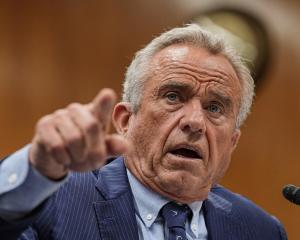Police have warned of hygiene problems at the Parliament protest and broken ranks with the Speaker about deploying pop music and lawn sprinklers on occupiers.
Prime Minister Jacinda Ardern said today that: "We all want them to leave".
Those gathered were an "imported form of protest" with a mix of Trump flags, Canadian flags and abusing members of the public for wearing a mask, Ardern told RNZ.
She believed the protest was anti-vaccine, not against the vaccine mandate.
Ardern told AM she did not approve of the tactics they had seen from the protesters.
"What we have seen out there seems much more anti-vaccination than anything else."

"We've seen some horrific behaviour down here.
Asked what her message to protesters was, Ardern said: "Go home - and take your children."
Former National MP Matt King joined the protest over the weekend and says he believes 98 per cent of them would leave if the mandates were removed.
"I believe we can remove most of them, if not all of them off if we get a rock-solid guarantee they will remove the mandates on a certain date," he told AM.
If police step in and begin arresting people again, more protesters would flock in, he said.
When asked how long it could go for, King said people were passionate about this issue and their human rights and felt there would be a tag team of people.
 Superintendent Corrie Parnell, Wellington District Commander, said negotiations at the Parliament convoy protest were largely unsuccessful, but were still being pursued. Photo: Mark Mitchell
Police worried about Covid-19, sanitation issues
Superintendent Corrie Parnell, Wellington District Commander, said negotiations at the Parliament convoy protest were largely unsuccessful, but were still being pursued. Photo: Mark Mitchell
Police worried about Covid-19, sanitation issues

Wellington District Commander Superintendent Corrie Parnell indicated yesterday that the protest would likely last for days at least, but negotiations were still being pursued.
He said about 400-500 people had consistently been in tents, the crowd peaked at about 3000, and police had spoken to key leaders and organisers.
"To date that hasn't been entirely successful," Parnell said on the occupation's sixth day, when New Zealand again broke daily records for new Covid-19 cases.
The risk of Covid spreading through the crowd was a major concern for police, Parnell said.
"Common logic would tell you in the presence of the audience we've got there, primarily no masks, a lot of non-vaccination mandate. That is a very real risk, not only to the occupiers but indeed to my staff."

"Sanitisation has been in the form of portaloos down there ... some of the filming has being quite graphic, particularly around children, and on the grounds the squalor of the water, defecation and surrounding environments."
Protesters have voiced a range of grievances but many oppose Covid-19 vaccine mandates.
"End mandates, we go home," one of many signs read.
It seemed a likely goal of police was to ameliorate the more obstructive protest elements, and tolerate a lawful, long-haul protest.
Parnell said it was important to reach a stage where members of the public could get to work and go about their business.
"Our goal is to get that back to a state of lawful protest."
Parnell said police had asked protest organisers and factions to move vehicles blocking access in some nearby streets.

Using the Defence Force to move vehicles would not be ruled out, but Parnell said this was ideally something to be avoided.
Portaloos appeared to be under pressure and children were playing in unhygienic conditions, with possible faecal contamination on the ground, he said.
Former lead police negotiator Lance Burdett told Newstalk ZB's Mike Hosking a mediator should have been brought in around day three.
"This is the thing, timing is everything – it's a fine line. First couple of days you've got to let people vent, we saw the same thing happen at Waikeria – it went on for too long, once you get past that seven-day mark you're now in trouble."
Wellington's Regional Public Health Unit yesterday said no known positive Covid-19 cases were linked to the protest.
Crooner Barry Manilow, whose dress sense was referenced in 1980s movie The Breakfast Club, earned another inglorious place in pop culture with the deployment of his music against protesters.
 Some protesters carried bales of hay to spread on the muddy lawn during the occupation at Parliament's grounds. Photo: Mark Mitchell
No arrests on Sunday
Some protesters carried bales of hay to spread on the muddy lawn during the occupation at Parliament's grounds. Photo: Mark Mitchell
No arrests on Sunday

Yesterday, the Speaker's speakers blasted out James Blunt and a scratchy, flute-infused version of Celine Dion's My Heart Will Go On.
But Speaker Trevor Mallard's decisions to use the music and Parliament's lawn sprinklers on the soak setting on Friday were not tactics police advised or endorsed, Parnell said.
"Look, it is what it is. It happened."
No arrests were reported at the Wellington protest yesterday, when heavy rain and high winds lashed the parliamentary precinct, turning Parliament's lawn into a sodden, muddy bog.
Intelligence analyst Dr Paul Buchanan said the police response last week involved an attempt to remove troublemakers with the arrest of 120 people on Thursday.
"They're selectively going after the A-holes," Buchanan said.
But much of the strategy was what he dubbed passive defence, where violent methods of suppression were avoided and the protest was largely expected to fizz out.
Buchanan, 36th Parallel Assessments director, said some arguments had emerged between protest factions.
"One of the axioms of irregular resistance is you've got to have a unity of purpose. They're all over the place," he said of the convoy group and lawn protesters.
Parnell indicated several hundred of those gathered in the protests were committed, and unlikely to be dislodged.
"That nucleus of 300-500 people, they've sat through an extreme weather event."












